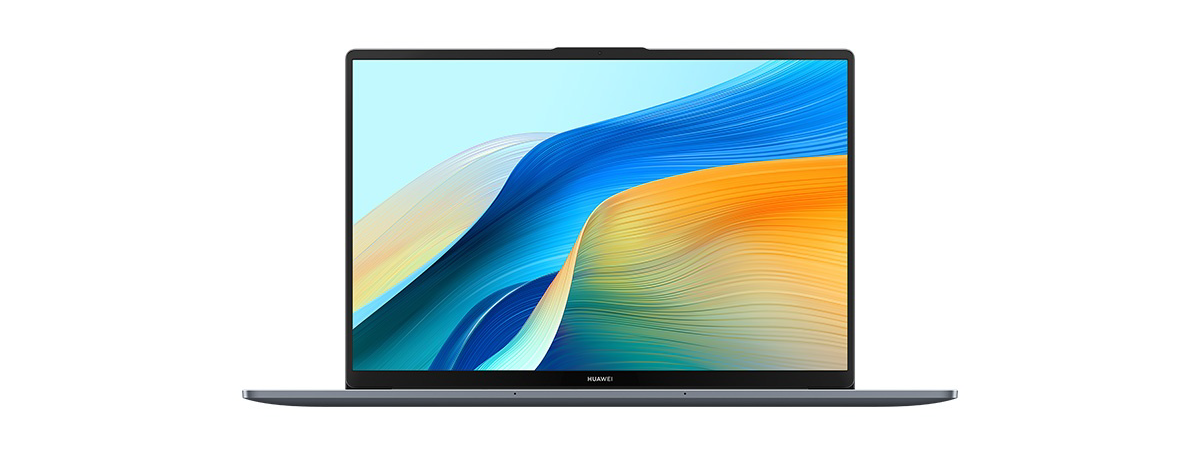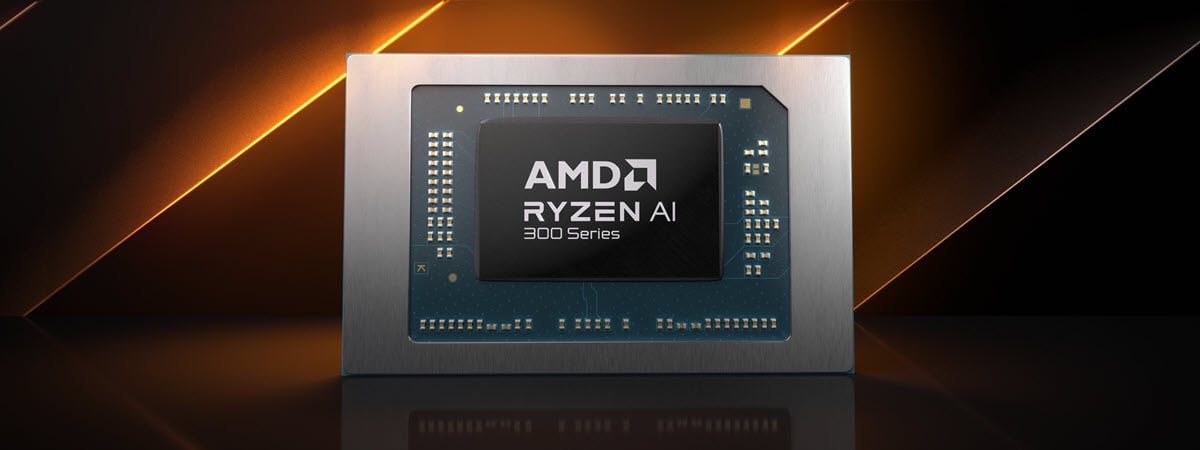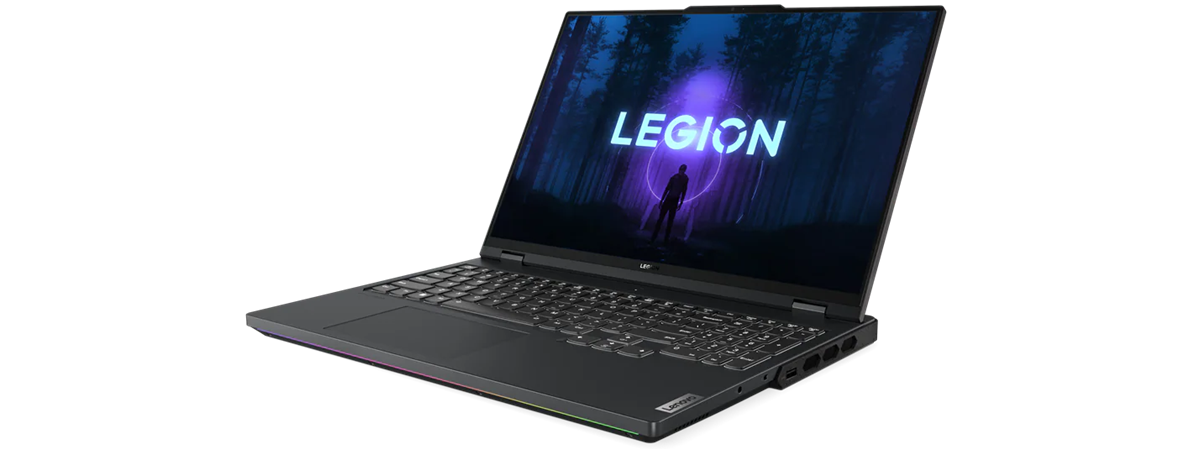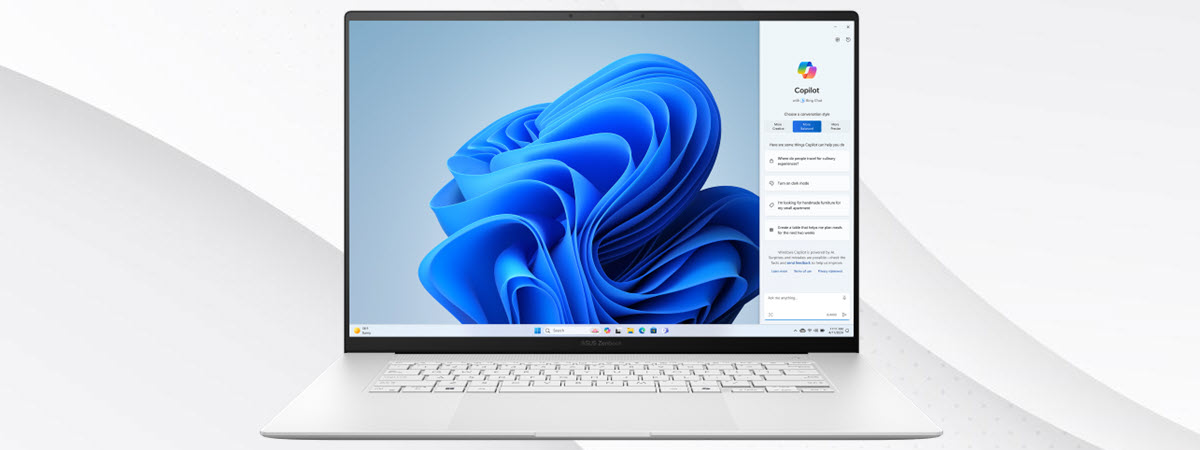
Performance in benchmarks
It's time to put the ASUS Zenbook S 16 (2024) through its paces with some benchmarks. I'll compare it to two interesting systems: the ASUS NUC 14 PRO+ mini PC and the ASUS Vivobook S 15 (S5507) laptop. The NUC 14 PRO+ is a tiny powerhouse, using laptop-grade hardware powered by the latest Intel Core Ultra 9 185H chip with its built-in AI accelerator. Meanwhile, the Vivobook S 15 uses the ARM architecture instead of x86 and is powered by a Snapdragon X Elite X1E78100 processor. This mix of devices should give us a good idea of how the AMD Ryzen 9 AI performs against one of the most recent Intel mobile processors and Qualcomm's push into Windows laptops.
You might raise an eyebrow at my choice to kick off the benchmarks with BootRacer, a tool that measures Windows boot times. But hear me out - a sluggish startup can be a real mood killer when you're eager to get work done. In my tests, the ASUS Zenbook S 16 (UM5606) showed a bit of lag in this department, taking around 22 seconds to load Windows 11. That's noticeably behind the ASUS Vivobook S 15, which sprints to the finish line in just 16 seconds.
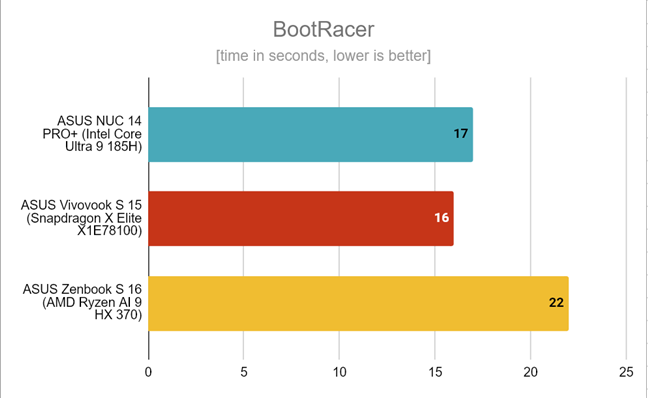
How fast ASUS Zenbook S 16 (2024) loads Windows 11
Next, I put the ASUS Zenbook S 16's heart - the AMD Ryzen AI 9 HX 370 processor - to the test using CPU-Z. In the Single Thread benchmark, this processor crushed the Snapdragon X Elite X1E78100 found in the ASUS Vivobook S 15, scoring a whopping 684 points. That's a staggering 75% higher than the 391 points obtained by the Vivobook S 15. When it comes to raw single-core performance, the Ryzen AI 9 HX 370 processor on the Zenbook S 16 is playing in a different league.
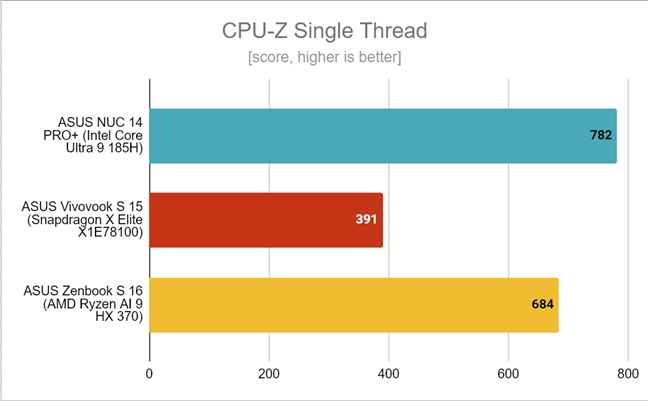
ASUS Zenbook S 16 - Benchmark results in CPU-Z Single Thread
The tables turned in the CPU-Z Multi Thread test, and Qualcomm's processor showed its strength, outpacing the AMD Ryzen AI 9 HX 370. As a result, the ASUS Vivobook S 15, powered by the Snapdragon processor, outperformed the ASUS Zenbook S 16 by a notable 13%.
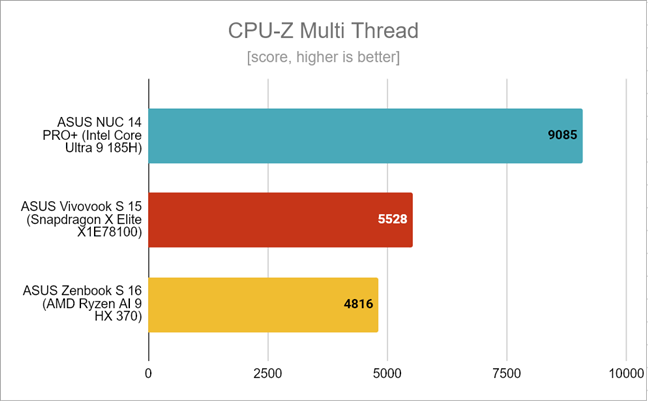
ASUS Zenbook S 16 - Benchmark results in CPU-Z Multi Thread
Moving on to Cinebench 2024, I ran its multi-core rendering benchmark. This test is useful because it simulates real-world scenarios like 3D rendering, video editing, and other processor-intensive tasks that creative professionals often tackle. Once again, the Snapdragon X Elite X1E78100 processor in the ASUS Vivobook S 15 showed its strength, outpacing the AMD Ryzen AI 9 HX 370 in the Zenbook S 16 by 16%.
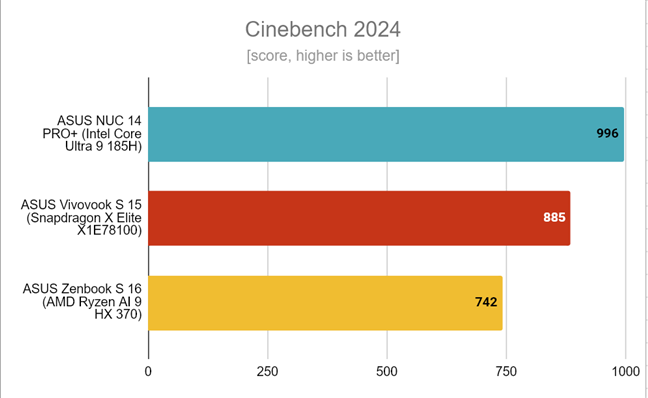
ASUS Zenbook S 16 - Benchmark results in Cinebench 2024
Given this year’s AI craze and the ASUS Zenbook S 16's status as a Copilot+ PC, I couldn't resist testing its AI capabilities. Enter Geekbench ML, a benchmark that puts devices through their paces with real-world machine-learning tasks. The results were nothing short of jaw-dropping. The Neural Processing Unit (NPU) in the ASUS Zenbook S 16 obliterated the competition, racking up 6001 points. To put that in perspective, it outperformed the ASUS Vivobook S 15 by a staggering 162%.
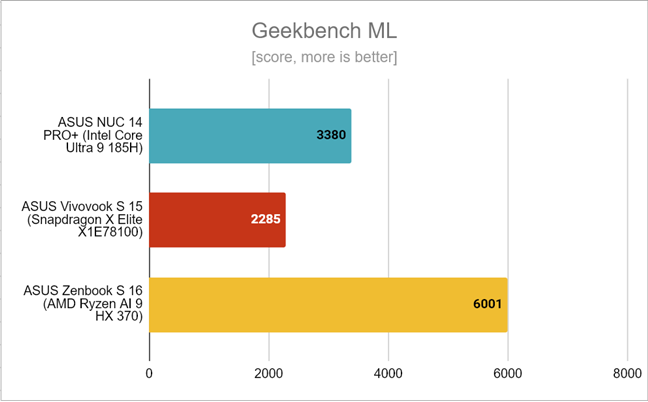
ASUS Zenbook S 16 - Benchmark results in GeekBench ML
Apps aren't just smartphone territory - they're crucial for laptop productivity, too. To see how the ASUS Zenbook S 16 handles app performance, I turned to PCMark 10. Unfortunately, this benchmark isn't ARM-friendly, so the ASUS Vivobook S 15 had to sit this one out. The Zenbook S 16 scored 7367 points and outpaced the NUC 14 PRO+ by 6%.
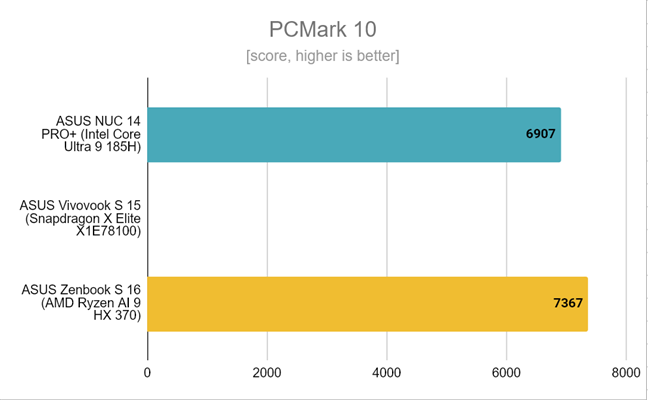
ASUS Zenbook S 16 - Benchmark results in PCMark 10
Fortunately, PCMark 10 offers an ARM-compatible test called PCMark 10 Applications. I ran this on both laptops, and the ASUS Zenbook S 16 came out ahead, outpacing the ASUS Vivobook S 15 by 7%. This result confirms that the Zenbook S 16 is a powerhouse for running everyday productivity apps. Whether you're crunching numbers in Excel, crafting presentations in PowerPoint, or collaborating in Teams, this laptop's got the muscle to keep things running smoothly.
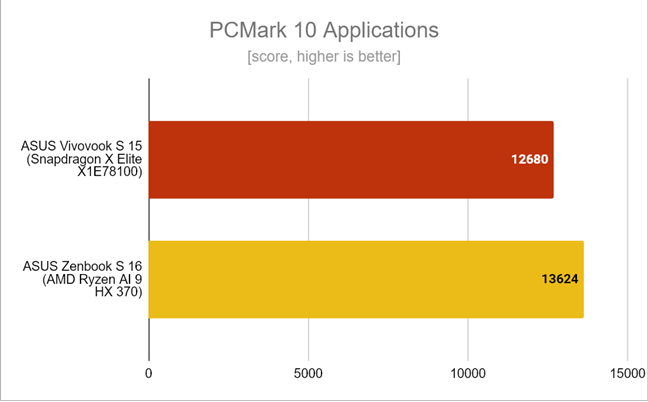
ASUS Zenbook S 16 - Benchmark results in PCMark 10 Applications
While tech giants like Microsoft are buzzing about AI solving everything, let's face it - our web browser is still the workhorse of our digital lives. That's why having a laptop that can zip through web pages is crucial. I fired up the JetStream 2 benchmark in Google Chrome to test this.
The ASUS Zenbook S 16 didn't disappoint. It came out on top in my comparison and proved it can render web pages with maximum ease. Quick web browsing paired with top-notch AI performance? This combination is hard to beat in my book. It's like having your cake and eating it, too: blazing through the web and doing your work while having cutting-edge AI power at your fingertips when you need it.
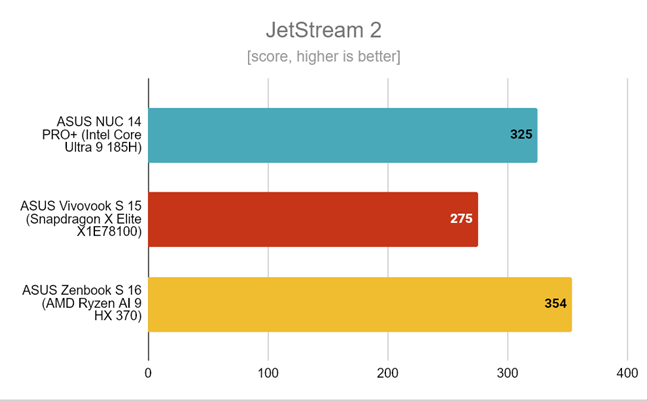
ASUS Zenbook S 16 - Benchmark results in JetStream 2
I couldn't resist putting the ASUS Zenbook S 16 through its gaming paces, even though it's not built for that. So, I ran the 3DMark Time Spy benchmark. The results? The Zenbook S 16 proved its power, outscoring the Vivobook S 15 by a hefty 60%, racking up 2920 points. That's a solid win for casual gaming. While these results are positive, Intel's integrated graphics are giving AMD Radeon a run for its money. AMD should step up its game in the integrated graphics department to keep its edge for casual gaming on the go.
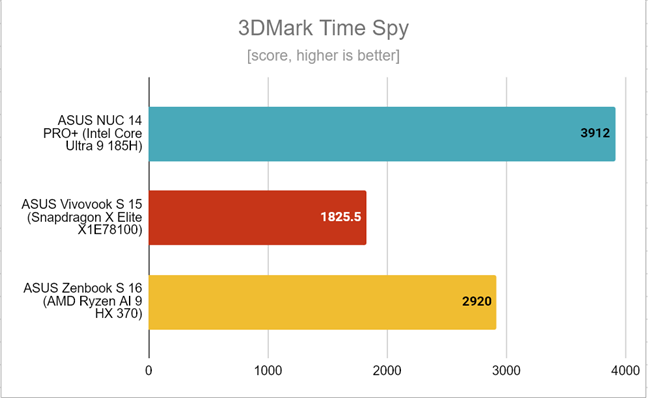
ASUS Zenbook S 16 - Benchmark results in 3DMark Time Spy
Now that we have a pretty good picture of the performance offered by this laptop, let's see how hot the AMD Ryzen AI 9 HX 370 processor gets when stressed under full load for a couple of minutes. The processor kept its cool, maxing at just 63 degrees Celsius (145.4 Fahrenheit). That's impressively low and a testament to both AMD's efficient chip design and ASUS's cooling system in the Zenbook S 16.
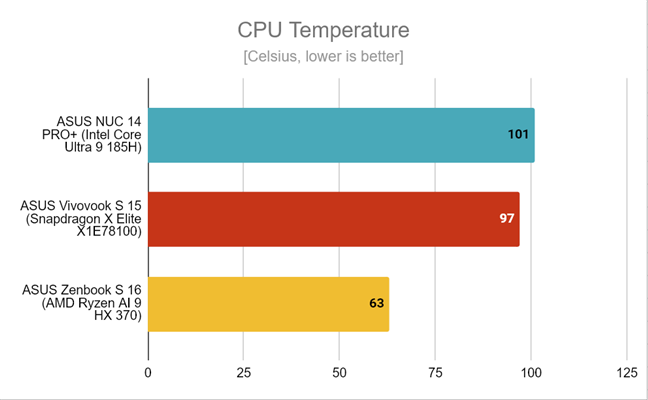
The maximum CPU temperature I've reached on this laptop
For the final benchmark, I measured the ASUS Zenbook S 16 (UM5606)'s power consumption during gaming. The results were impressive: the laptop drew only 36 Watts, significantly less than the systems I’ve compared it to. Such efficiency is a testament to AMD's great processor design. They've managed to strike an excellent balance between performance and power consumption - a feat that has been challenging to achieve on laptops using the x86 architecture.
The implications of this low power draw are notable: extended battery life, reduced heat output, silent operation, and lower energy costs. For users who prioritize portability and efficiency without sacrificing performance, the ASUS Zenbook S 16 is one of the best choices available.
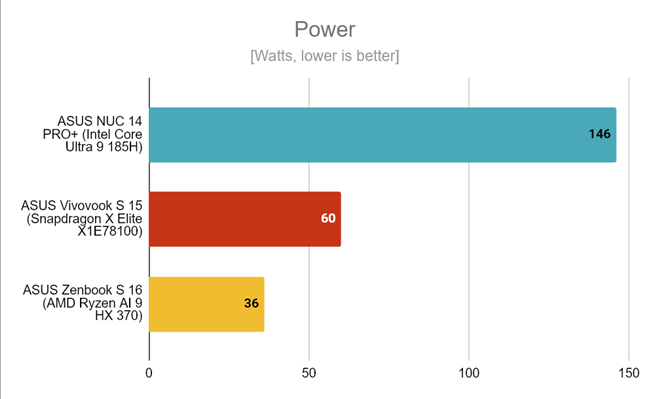
ASUS Zenbook S 16 is very power efficient
Phew! I've put the ASUS Zenbook S 16 through its paces with a marathon of benchmarks. Trust me, I ran even more tests, but I'll spare you the endless charts and graphs, so you won't quit reading this review before you get to the finish.😉
So, what's the verdict? While the Zenbook S 16 might not always be the heavyweight champ, this laptop shines in many key areas: it is energy efficient, keeps its cool under pressure, breezes through productivity apps, surfs the web at lightning speed, and flexes some serious muscle when it comes to running AI workloads. In a nutshell, the Zenbook S 16 performs like a well-rounded athlete who may not win every single event but consistently performs at a high level across the board.
Is there anything else you would like to know?
Thank you for reading this review for the ASUS Zenbook S 16 (2024). I hope the benchmark data and user experience insights I included prove helpful in your decision-making process. If you have any questions, please ask using the commenting options below. If you found this review valuable, consider sharing it with others through WhatsApp, social media, or any other platform. In today's crowded internet, your shares help quality content reach those who need it. Thank you!🙂


 16.08.2024
16.08.2024 